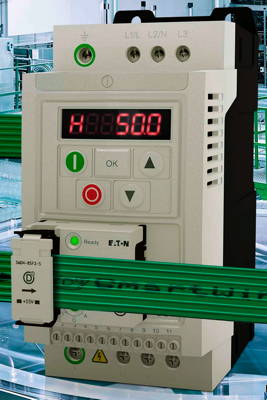![]() Just three years after launching its previous generation of variable speed drives, Eaton unveiled a new series at the recent SPS/IPC/Drives show. The new PowerXL drives, which have been designed and built for Eaton in the UK, cover ratings up to 250kW.
Just three years after launching its previous generation of variable speed drives, Eaton unveiled a new series at the recent SPS/IPC/Drives show. The new PowerXL drives, which have been designed and built for Eaton in the UK, cover ratings up to 250kW.

The new drives (above) are the first to support (via plug-in modules) Eaton`s SmartWire-DT connection and communication technology which eliminates the need for conventional control circuit wiring. Users will be able to parameterise the drives centrally via SmartWire-DT, as well as sending control commands to them and reading diagnostic data from them. The drives can also be controlled using the ProfiDrive profile.
There are currently two models: the DC1 Compact, a basic V/f model covering ratings from 0.37–11kW in three frame sizes; and the DA1 Advanced Machinery Drive, for high-performance applications from 0.75–250kW, in seven frame sizes. The DC1 versions can operate at 150% of their rated power for 60 seconds and at 175% for 2 seconds.
The DA1 models offer a choice between sensorless vector control, or closed-loop control with a rotary encoder. The former can deliver 200% torque at 0Hz. PLC functions are built in, as are a PID controller and software for applications such as cranes, lifts, winding machines and compressors. IP55-protected versions are available in ratings up to 160kW.
The DA1 series can drive either standard three-phase induction motors or high-efficiency permanent magnet motors. An energy optimiser can reduce the motor voltage automatically for light loads.
The drives are said to be easy to use with self-explanatory type codes, auto-tune functions and parameterisation using only 14 standard parameters. As well as programming via built-in keys or a PC, users can also copy parameter settings from one drive to another using a Bluetooth memory stick with an RJ-45 interface.
Support for Modbus RTU and CANopen is standard, with other bus systems such as Profibus, Profinet, DeviceNet, EthernetIP, EtherCat, Modbus TCP and BACnet, being catered for by expansion modules.
